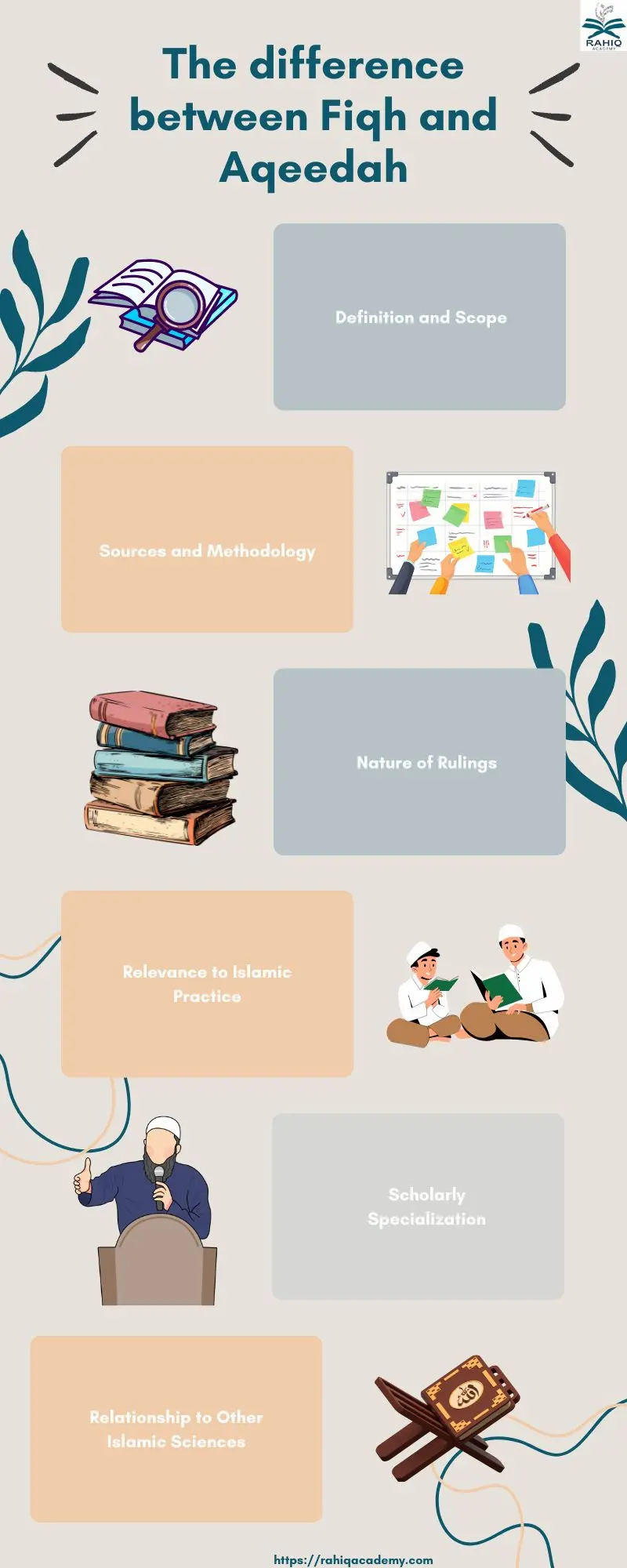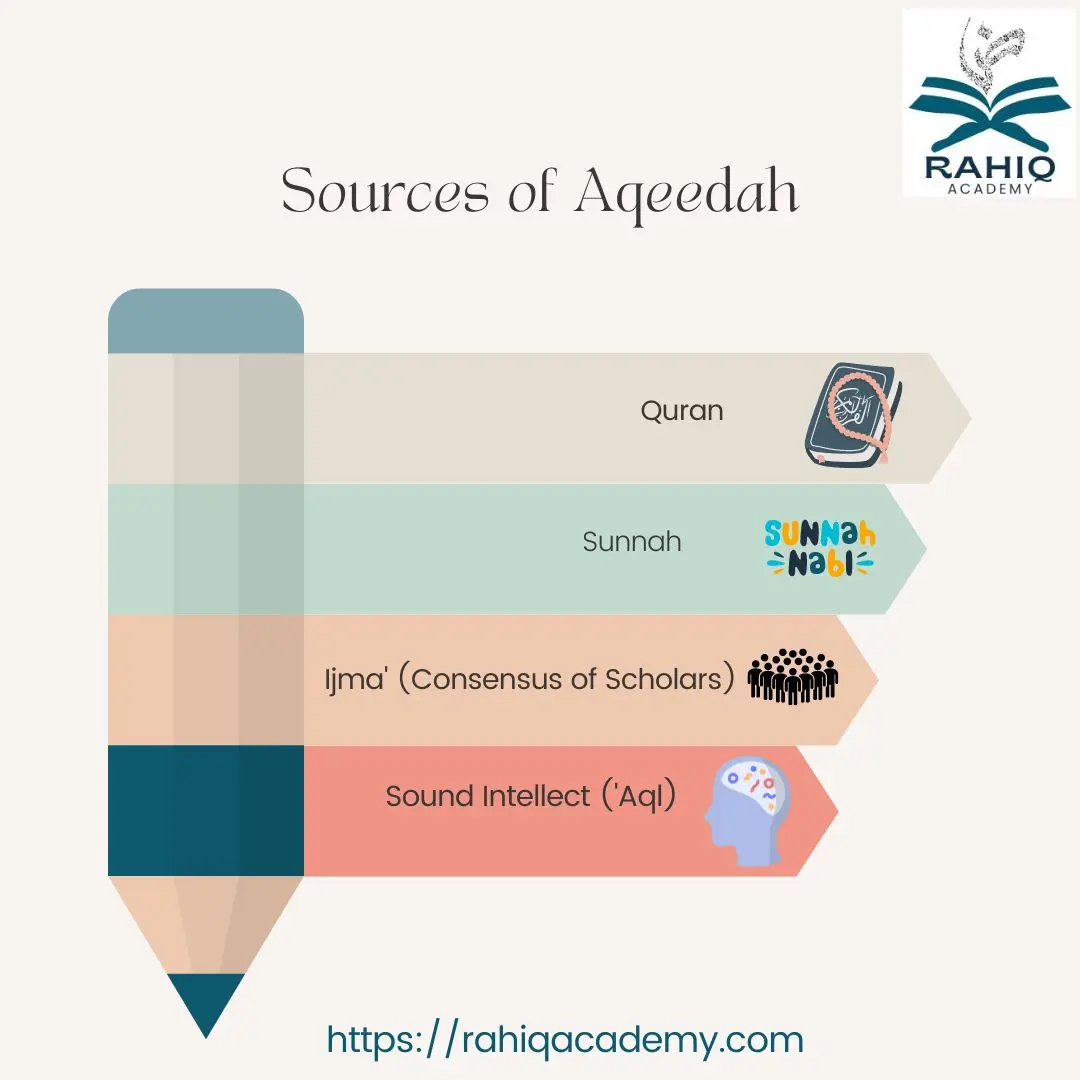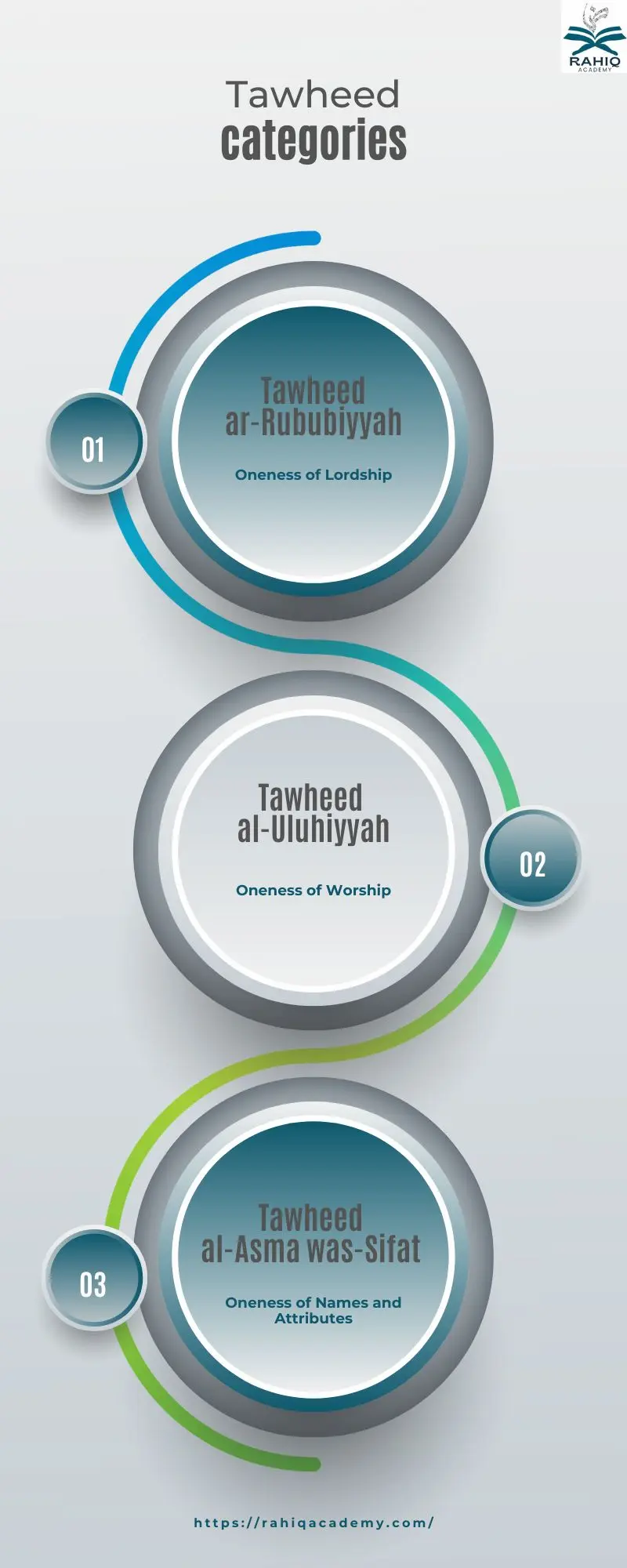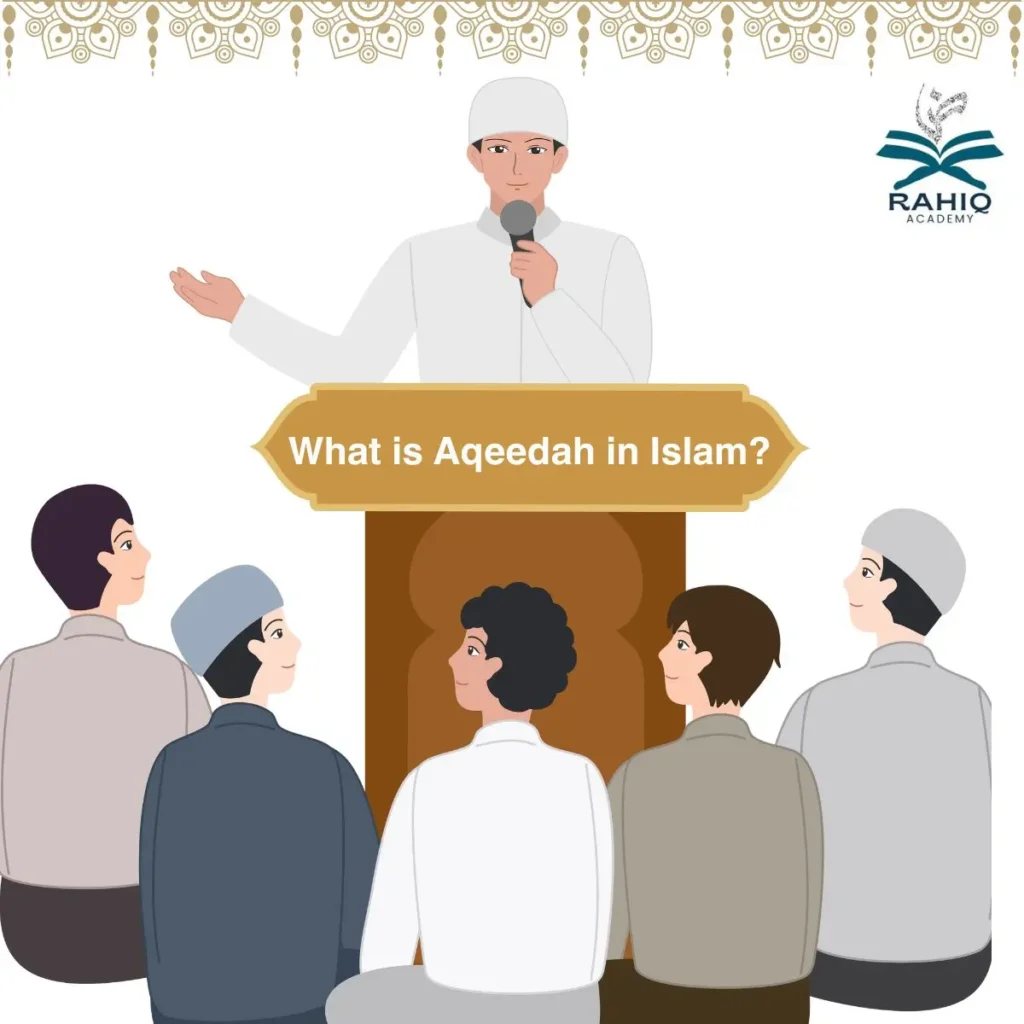In the realm of Islamic knowledge, Aqeedah holds a position of paramount importance. It forms the bedrock of a Muslim’s faith and shapes their understanding of Allah, the universe, and their purpose in life. This comprehensive guide delves into the various aspects of Aqeedah, providing a thorough understanding for both new Muslims and those seeking to deepen their faith. and answering the most important question what is Aqeedah in Islam?
What is Aqeedah in Islam?
Aqeedah, often translated as “creed” or “belief,” forms the foundation of a Muslim’s faith. In Arabic, the word ‘aqeedah’ comes from the root ‘aqada,’ which means to tie, fasten, or knot securely. In the context of Islamic teachings, Aqeedah refers to those beliefs that are firmly established in one’s heart, leaving no room for doubt or uncertainty.
The importance of Aqeedah in Islam cannot be overstated. It encompasses the core tenets of faith that every Muslim must understand and adhere to. These beliefs shape a Muslim’s worldview, guide their actions, and provide the framework for their relationship with Allah (God) and His creation.
The Prophet Muhammad (peace be upon him) emphasized the significance of correct belief in a hadith narrated by Muslim:
عَنْ أَبِي هُرَيْرَةَ، أَنَّ رَسُولَ اللَّهِ صلى الله عليه وسلم قَالَ: “الإِيمَانُ بِضْعٌ وَسَبْعُونَ أَوْ بِضْعٌ وَسِتُّونَ شُعْبَةً، فَأَفْضَلُهَا قَوْلُ لاَ إِلَهَ إِلاَّ اللَّهُ، وَأَدْنَاهَا إِمَاطَةُ الأَذَى عَنِ الطَّرِيقِ، وَالْحَيَاءُ شُعْبَةٌ مِنَ الإِيمَانِ”
Abu Huraira reported: The Messenger of Allah, peace and blessings be upon him, said, “Faith has over seventy branches or over sixty branches, the most excellent of which is the declaration that there is no god but Allah, and the humblest of which is the removal of what is injurious from the path: and modesty is a branch of faith.” (Sahih Muslim 35)
This hadith underscores that faith (Iman) is multifaceted, with the declaration of Allah’s oneness (which is a core aspect of Aqeedah) being its highest form.
In Islamic sciences, Aqeedah is studied alongside Fiqh (jurisprudence) and Tasawwuf (spirituality). While Fiqh deals with the outward actions of worship and daily life, and Tasawwuf focuses on the purification of the heart, Aqeedah is concerned with the correct understanding of Allah, His messengers, and the unseen aspects of creation. Together, these three branches of knowledge aim to perfect a Muslim’s faith, practice, and character.
Importance of Aqeedah
The Importance of Aqeedah in Islam cannot be overstated. It serves as the cornerstone of a Muslim’s faith and plays a crucial role in shaping their understanding of Allah, the universe, and their purpose in life.
1. Foundation of Faith
Aqeedah forms the bedrock upon which all other aspects of Islam are built. Allah says in the Quran:
فَاعْلَمْ أَنَّهُ لَا إِلَٰهَ إِلَّا اللَّهُ
“So know that there is no deity except Allah.” (Quran 47:19)
This verse emphasizes the primacy of correct belief in Islamic faith. Without a solid Aqeedah, one’s worship and actions may be rendered meaningless.
2. Guidance for Life
Correct Aqeedah provides Muslims with a comprehensive worldview that guides their actions and decisions. It helps them navigate the complexities of life with a clear sense of purpose and direction.
3. Protection from Misguidance
In a hadith narrated by Al-Bukhari, the Prophet Muhammad (peace be upon him) said:
إِنَّ اللَّهَ لاَ يَقْبِضُ الْعِلْمَ انْتِزَاعًا يَنْتَزِعُهُ مِنَ الْعِبَادِ، وَلَكِنْ يَقْبِضُ الْعِلْمَ بِقَبْضِ الْعُلَمَاءِ حَتَّى إِذَا لَمْ يُبْقِ عَالِمًا اتَّخَذَ النَّاسُ رُءُوسًا جُهَّالاً فَسُئِلُوا فَأَفْتَوْا بِغَيْرِ عِلْمٍ فَضَلُّوا وَأَضَلُّوا
“Allah does not take away the knowledge by taking it away from (the hearts of) the people, but takes it away by the death of the religious learned men till when none of the (religious learned men) remains, people will take as their leaders ignorant persons who when consulted will give their verdict without knowledge. So they will go astray and will lead the people astray.”
This hadith highlights the importance of preserving and seeking correct knowledge, particularly in matters of Aqeedah, to protect oneself and others from misguidance.
4. Unity among Muslims
A correct and unified Aqeedah serves as a binding force for the Muslim community. It provides a common ground for believers, transcending cultural, ethnic, and geographical boundaries.
5. Criterion for acceptance of deeds
In Islam, the acceptance of good deeds is contingent upon correct belief. The Prophet Muhammad (peace be upon him) said:
مَنْ مَاتَ وَهُوَ يَعْلَمُ أَنَّهُ لاَ إِلَهَ إِلاَّ اللَّهُ دَخَلَ الْجَنَّةَ
“Whoever dies knowing that there is no god but Allah will enter Paradise.” (Sahih Muslim 26)
This hadith underscores the paramount importance of maintaining correct belief until one’s last breath.
6. Spiritual and Psychological Well-being
A strong Aqeedah provides believers with a sense of security, peace, and contentment. It offers answers to existential questions and helps in coping with life’s challenges.
the importance of Aqeedah in Islam is multifaceted. It not only defines a Muslim’s relationship with Allah but also shapes their interaction with the world around them. As such, seeking knowledge of Aqeedah and striving to perfect one’s belief is an ongoing obligation for every Muslim throughout their life.
The difference between Fiqh and Aqeedah

While both Fiqh and Aqeedah are integral parts of Islamic knowledge, they serve different purposes and focus on distinct aspects of a Muslim’s life. Understanding the difference between Fiqh and Aqeedah these two branches of Islamic science is crucial for a comprehensive grasp of the religion.
1. Definition and Scope
Aqeedah: The term ‘Aqeedah’ refers to the core beliefs and tenets of Islam. It encompasses what a Muslim must believe in their heart with certainty. Aqeedah deals with matters of faith, such as belief in Allah, His angels, His books, His messengers, the Day of Judgment, and the divine decree.
Fiqh: The word ‘Fiqh’ literally means deep understanding or comprehension. In Islamic context, it refers to the body of Islamic law extracted from detailed Islamic sources. Fiqh deals with the practical aspects of a Muslim’s life, including worship, transactions, and conduct.
2. Sources and Methodology
Aqeedah: The primary sources for Aqeedah are the Quran and authentic Hadiths. The methodology used in Aqeedah is based on clear, unambiguous textual evidence and rational arguments that support these beliefs.
Fiqh: While Fiqh also relies on the Quran and Sunnah, it additionally incorporates ijma (consensus of scholars) and qiyas (analogical reasoning). Fiqh involves a more complex methodology of deriving rulings, including principles of jurisprudence (usul al-fiqh).
3. Nature of Rulings
Aqeedah: The matters of Aqeedah are absolute and do not change over time or with circumstances. They are considered fundamental and non-negotiable aspects of faith.
Fiqh: Fiqh rulings can be more flexible and may vary based on time, place, and circumstances. Different schools of Islamic jurisprudence may have varying opinions on certain fiqh issues.
4. Relevance to Islamic Practice
Aqeedah: Relates to what a Muslim believes (the ‘why’ of Islam).
Fiqh: Concerns how a Muslim practices their faith (the ‘how’ of Islam).
5. Scholarly Specialization
Scholars who specialize in Aqeedah are often referred to as ‘ulama al-aqeedah’ or ‘mutakallimun’, while those who specialize in Fiqh are called ‘fuqaha’ (jurists).
6. Relationship to Other Islamic Sciences
As mentioned in one of the sources
قال الإمام الغزالي رحمه الله: “العلم ثلاثة: علم في القلب وهو علم المكاشفة، وعلم في اللسان وهو علم العبارة، وعلم في الجوارح وهو علم المعاملة”
Imam al-Ghazali (may Allah have mercy on him) said: “Knowledge is of three types: knowledge in the heart, which is the science of unveiling; knowledge on the tongue, which is the science of expression; and knowledge in the limbs, which is the science of interaction.”
This statement can be interpreted to relate Aqeedah to the knowledge of the heart, while Fiqh is more closely associated with the knowledge of the limbs (i.e., actions).
while Aqeedah and Fiqh are distinct branches of Islamic knowledge, they are complementary and equally important. A strong Aqeedah provides the foundation for proper understanding and implementation of Fiqh, while correct Fiqh practices reinforce and manifest one’s Aqeedah. Together, they form a comprehensive framework for a Muslim’s belief and practice.
Correct Aqeedah
The concept of correct or sound Aqeedah is crucial in Islam, as it forms the foundation of a Muslim’s faith and practices. Correct Aqeedah is derived from the Quran and the authentic Sunnah of Prophet Muhammad (peace be upon him), as understood and practiced by the earliest generations of Muslims.
Key Aspects of Correct Aqeedah
Tawheed (Oneness of Allah)
The most fundamental aspect of correct Aqeedah is the belief in the absolute oneness of Allah. This includes:
– Tawheed ar-Rububiyyah: Believing that Allah alone is the Creator, Sustainer, and Controller of all that exists.
– Tawheed al-Uluhiyyah: Worshipping Allah alone without any partners or intermediaries.
– Tawheed al-Asma was-Sifat: Affirming Allah’s names and attributes as mentioned in the Quran and Sunnah, without distortion, denial, or anthropomorphism.
Allah says in the Quran
قُلْ هُوَ اللَّهُ أَحَدٌ * اللَّهُ الصَّمَدُ * لَمْ يَلِدْ وَلَمْ يُولَدْ * وَلَمْ يَكُن لَّهُ كُفُوًا أَحَدٌ
“Say, ‘He is Allah, [who is] One, Allah, the Eternal Refuge. He neither begets nor is born, Nor is there to Him any equivalent.'” (Quran 112:1-4)
Belief in the Angels
Believing in the existence of angels as created beings of light who obey Allah’s commands without question.
Belief in the Divine Books
Accepting all the books revealed by Allah, with the Quran being the final and preserved revelation.
Belief in the Prophets and Messengers
Believing in all the prophets and messengers sent by Allah, with Muhammad (peace be upon him) as the final prophet.
Belief in the Day of Judgment
Affirming the reality of the Day of Resurrection, accountability, and the existence of Paradise and Hell.
Belief in Divine Decree (Qadar)
Accepting that everything that happens is by the will and decree of Allah, while also believing in human free will and responsibility.
Methodology for Establishing Correct Aqeedah
Adherence to the Quran and Sunnah
The Prophet Muhammad (peace be upon him) said
تَرَكْتُ فِيكُمْ أَمْرَيْنِ لَنْ تَضِلُّوا مَا تَمَسَّكْتُمْ بِهِمَا: كِتَابَ اللَّهِ وَسُنَّةَ نَبِيِّهِ
“I have left among you two matters by holding fast to which you shall never be misguided: the Book of Allah and my Sunnah.” (Muwatta Malik)
Following the Understanding of the Salaf
The early generations of Muslims, particularly the Companions of the Prophet, had the purest understanding of Islam. Their interpretation and practice serve as a guide for correct Aqeedah.
Avoiding Innovation (Bid’ah)
Introducing new beliefs or practices into the religion is strongly warned against. The Prophet (peace be upon him) said:
مَنْ أَحْدَثَ فِي أَمْرِنَا هَذَا مَا لَيْسَ مِنْهُ فَهُوَ رَدٌّ
“Whoever introduces into this affair of ours that which is not from it will have it rejected.” (Sahih al-Bukhari 2697)
Seeking Knowledge
Continuous learning and seeking clarification from knowledgeable scholars is essential for maintaining and strengthening correct Aqeedah.
Avoiding Extremism and Negligence
Maintaining a balanced approach in matters of faith, avoiding both extremism and negligence.
correct Aqeedah is rooted in the pure teachings of Islam as found in the Quran and authentic Sunnah, and as understood by the righteous predecessors (Salaf). It requires constant vigilance, learning, and sincere implementation in one’s life.
By adhering to correct Aqeedah, a Muslim safeguards their faith and ensures that their worship and actions are in accordance with Allah’s pleasure.
Sources of Aqeedah

The sources of Aqeedah in Islam are fundamental and unchanging. They provide the basis for all beliefs and practices in the religion. Understanding these sources is crucial for every Muslim to ensure that their faith is built on a solid foundation. The primary sources of Aqeedah are
Quran
The Quran is the first and most important source of Aqeedah. It is the direct word of Allah, revealed to Prophet Muhammad (peace be upon him) through the angel Jibreel (Gabriel). The Quran contains clear statements about the core beliefs of Islam.
Allah says in the Quran
ذَٰلِكَ الْكِتَابُ لَا رَيْبَ ۛ فِيهِ ۛ هُدًى لِّلْمُتَّقِينَ
“This is the Book about which there is no doubt, a guidance for those conscious of Allah.” (Quran 2:2)
The Quran provides detailed information about Allah’s attributes, the nature of prophethood, the afterlife, and other aspects of the unseen that form the core of Islamic belief.
Sunnah
Sunnah refers to the sayings, actions, and tacit approvals of Prophet Muhammad (peace be upon him). It is the second source of Aqeedah and serves to explain and elaborate on the teachings of the Quran.
The importance of the Sunnah is emphasized in the Quran
وَمَا آتَاكُمُ الرَّسُولُ فَخُذُوهُ وَمَا نَهَاكُمْ عَنْهُ فَانتَهُوا
“And whatever the Messenger has given you – take; and what he has forbidden you – refrain from.” (Quran 59:7)
The Sunnah includes many hadiths that directly address matters of Aqeedah, such as the famous Hadith of Jibreel, which outlines the pillars of faith.
Ijma’ (Consensus of Scholars)
While the Quran and Sunnah are the primary sources, the consensus of scholars (Ijma’) on matters of Aqeedah is also considered authoritative, especially when it comes to understanding and interpreting the texts from the first two sources.
Sound Intellect (‘Aql)
Islam encourages the use of reason and intellect in understanding and affirming the truths of Aqeedah. However, it’s important to note that intellect is subservient to revelation and is used to comprehend and support the teachings of the Quran and Sunnah, not to contradict them.
The Quran often calls for the use of reason
أَفَلَا يَتَدَبَّرُونَ الْقُرْآنَ ۚ وَلَوْ كَانَ مِنْ عِندِ غَيْرِ اللَّهِ لَوَجَدُوا فِيهِ اخْتِلَافًا كَثِيرًا
“Then do they not reflect upon the Quran? If it had been from [any] other than Allah, they would have found within it much contradiction.” (Quran 4:82)
Important Considerations
Hierarchy of Sources
The Quran and authentic Sunnah take precedence over all other sources. Any interpretation or understanding that contradicts these primary sources is rejected.
Authenticity
When relying on hadiths for matters of Aqeedah, it’s crucial to ensure their authenticity. Scholars have developed rigorous methods for verifying the authenticity of hadiths.
Proper Understanding
The texts of the Quran and Sunnah should be understood according to the interpretation of the Salaf (early generations of Muslims), who had the best understanding of the religion.
Avoiding Innovation
Introducing new beliefs or practices not found in these authentic sources is considered a grave error in matters of Aqeedah.
Continuous Learning
Muslims are encouraged to continuously study and reflect upon these sources to deepen their understanding of Aqeedah.
the sources of Aqeedah in Islam are clear and well-defined. By adhering to these authentic sources and understanding them correctly, Muslims can ensure that their beliefs are in line with the true teachings of Islam, safeguarding themselves from deviation and innovation in matters of faith.
The difference between Aqeedah and Tawheed
While Aqeedah and Tawheed are closely related concepts in Islam, they are not identical. Understanding the difference between Aqeedah and Tawheed these two terms is crucial for a comprehensive grasp of Islamic theology.
Aqeedah
Aqeedah, derived from the Arabic root word ‘aqada’ meaning to tie or knot, refers to the overall system of beliefs in Islam. It encompasses all aspects of faith that a Muslim must believe in with certainty.
Aqeedah includes
1. Belief in Allah
2. Belief in His angels
3. Belief in His books
4. Belief in His messengers
5. Belief in the Day of Judgment
6. Belief in divine decree (Qadar)
Tawheed

Tawheed, derived from the Arabic word ‘wahhada’ meaning to unify or assert oneness, specifically refers to the oneness and uniqueness of Allah. It is the most fundamental principle in Islamic theology.
Tawheed is typically divided into three categories
1. Tawheed ar-Rububiyyah (Oneness of Lordship)
2. Tawheed al-Uluhiyyah (Oneness of Worship)
3. Tawheed al-Asma was-Sifat (Oneness of Names and Attributes)
Key Differences
Scope
– Aqeedah is broader and encompasses all aspects of Islamic belief.
– Tawheed specifically focuses on the oneness of Allah.
Relationship
– Tawheed is a crucial part of Aqeedah, but Aqeedah includes beliefs beyond Tawheed.
Foundation
– Tawheed forms the foundation upon which the entire structure of Aqeedah is built.
Linguistic Usage in Islamic Texts
While the concepts of both Aqeedah and Tawheed are present throughout Islamic teachings, it’s worth noting that the specific terms “Aqeedah” and “Tawheed” as technical terms are not explicitly mentioned in the Quran. However, their meanings and principles are abundantly clear in both the Quran and Sunnah.
For instance, Allah says in the Quran:
قُلْ هُوَ اللَّهُ أَحَدٌ
“Say, ‘He is Allah, [who is] One'” (Quran 112:1)
This verse embodies the essence of Tawheed without using the term itself.
Historical Development
– The term Aqeedah, as a comprehensive system of beliefs, developed over time as scholars systematized Islamic theology.
– The concept of Tawheed, while always central to Islam, was further elaborated and categorized by later scholars to address various forms of deviation from pure monotheism.
Focus in Islamic Studies
– Studies in Aqeedah often cover a wide range of theological topics.
– Studies in Tawheed specifically focus on understanding and implementing the oneness of Allah in all aspects of life.
Importance of Understanding the Difference
1. Comprehensive Faith: Recognizing that Tawheed is a part of Aqeedah helps Muslims understand that their faith encompasses more than just the belief in Allah’s oneness.
2. Prioritization: Understanding Tawheed as the core of Aqeedah helps in prioritizing this most fundamental belief.
3. Protection from Deviation: Clear understanding of both concepts helps protect against various forms of shirk (associating partners with Allah) and bid’ah (innovation in religion).
4. Balanced Approach: Recognizing the relationship between Aqeedah and Tawheed promotes a balanced approach to studying and implementing Islamic beliefs.
while Aqeedah and Tawheed are distinct concepts, they are intrinsically linked. Tawheed forms the core of Islamic Aqeedah, and a sound understanding of both is essential for every Muslim. This understanding ensures that one’s faith is built on a solid foundation, encompassing all aspects of belief while maintaining focus on the most fundamental principle of Islam – the oneness of Allah.
FAQ
Q:What Are the 4 Categories of Aqeedah?
- Tawheed (Oneness of Allah): This is the belief that Allah is the only deity worthy of worship.
- Risalah (Prophethood): This involves belief in the prophets Allah sent to guide humanity.
- Akhirah (Afterlife): This belief encompasses the Day of Judgment and the concept of Qadar
- (Divine Decree): This is the belief in Allah’s knowledge and power over all things.
Q:What is Aqeedah for Beginners?
A:For beginners, Aqeedah is an introduction to the six articles of faith that form the basis of Islamic belief. These include:
- Belief in Allah
- Belief in Angels
- Belief in Prophets
- Belief in Revealed Books
- Belief in the Day of Judgment
- Belief in Divine Decree (Qadar)
Conclusion
Understanding Aqeedah is crucial for every Muslim, as it forms the foundation of their faith and guides their actions in this world.
For those seeking to deepen their knowledge of Aqeedah, Islamic studies, and Arabic language, RAHIQ ACADEMY offers comprehensive courses. our online Aqeedah course provides an excellent opportunity to study this vital aspect of Islam under the guidance of knowledgeable instructors.
By strengthening one’s Aqeedah, a Muslim not only enhances their relationship with Allah but also develops a deeper understanding of their purpose in life.
This knowledge serves as a shield against misconceptions and innovations in religion, ensuring that one’s faith remains pure and in line with the teachings of the Quran and the Sunnah of Prophet Muhammad (peace be upon him).
May Allah grant us all the ability to understand and implement correct Aqeedah in our lives, and may He guide us to the straight path. Ameen.




